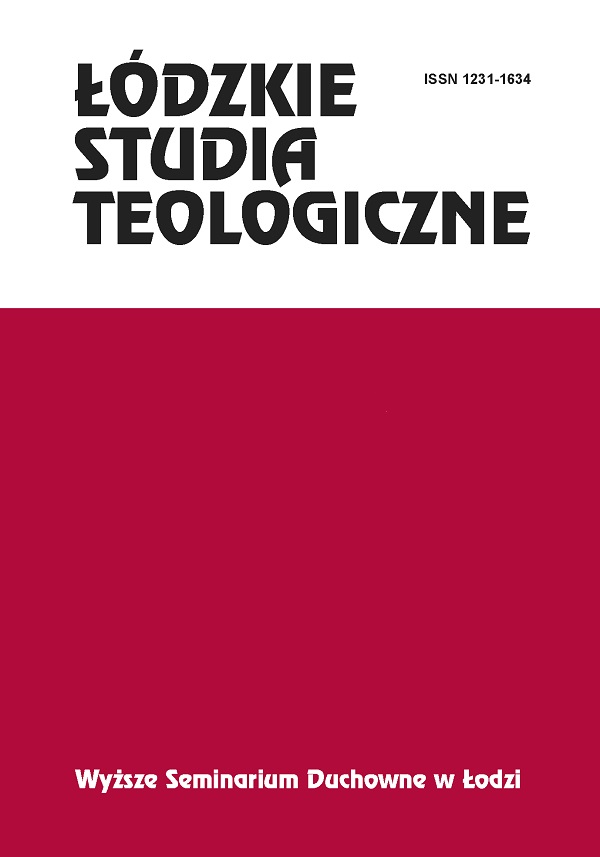Poglądy filozoficzne biskupa Michała Klepacza
Bishop Michał Klepacz's philosophical views
Author(s): Szczepan ŚlagaSubject(s): Christian Theology and Religion, Epistemology, Contemporary Philosophy, Philosophy of Religion, Higher Education , History of Education
Published by: Wyższe Seminarium Duchowne w Łodzi
Keywords: Bishop Michał Klepacz; philosophical views;
Summary/Abstract: This year we are celebrating the 100th anniversary of the birth of Bishop Michel Klepacz (1893-1967), great thinker and great humanist. This is an opportunity to rethink his activities and his works. He was born in Warsaw. He studied at the Diocesan Seminary in Kielce. Then he continued his studies at the Ecclesiastical Academy in Petersburg and at the Catholic University of Lublin. From 1919 he taught theology and philosophy at the Kielce Seminary. At the same time he was in charge of pastoral work, especially in Catholic youth associations. He also gave lectures on the radio. In 1932 he defended his doctoral thesis. In 1937 he became professor of Christian philosophy at Stefan Batory University in Vilnius. During the war he was imprisoned by the Gestapo and remained more than two years in the concentration camps. He was sentenced to forced labor as well. After the liberation, he worked in Vilnius and Białystok. From 1947, for 20 years, he was pastor of the diocese of Łódź. The most important writings (in Polish) of M. Klepacz: The idea of God in the philosophy of history of Auguste Cieszkowski on the basis of the thought of that time, Kielce 1933; Currents of organization and educational ideals in contemporary Polish teaching, Katowice 1937; The vital values of religion, Kielce 1936; The ideals of the Middle Ages and present times, Kielce 1936; Karol Hubert Rostworowski, Wilno 1938; St. Thomas at the historical base of human thought, Kraków 1948. The present article is devoted to the reflection on the philosophical thought of Bishop Klepacz. In the first part of his essay after presenting life and scientific activity, the author analyzes opinions on the philosophy of history of Bishop Klepacz, particularly the idea of God in the philosophy of history of Auguste Cieszkowski. According to the bishop, this idea is incompatible with orthodox Catholic doctrine. In the second part of his essay devoted to the philosophical thought of the bishop K. Klepacz, the author analyzes his methodological, cosmological and biophilosophical views. According to Klepacz, the natural sciences using a method of observation and measurements are completely empiriological because they do not go outside the category of the phenomenon. Bishop Klepacz shows that at the base of each science, we accept three methaphysical principles: a. the unity and universality of human intelligence (reason); b. the capacity of the adequate knowledge of reality; c. the existence of order in the world. The scientific knowledge which today boasts of great successes, at the same time shows a certain limit which comes from empirical methods; it has a hypothetical and approximate character (only gives the possibility of approaching reality). Hence the need to use philosophy and faith to have an adequate view of the world as a principle of just conduct and the meaning and purpose of human life. Then the author reflects on cosmological and biophilosophical opinions. From the analysis of the successes of physics, astronomy and biology Bishop Klepacz draws the conclusion that the natural sciences do not give the possibility of the materialistic, deterministic and naturalistic interpretation of reality. On the contrary, they serve the progress and the good of man, they show that the spiritual principle exists in the world and finally, that God is Creator and the first Cause of all. Especially, this is evident in the case of the mystery of life and the arrangement of life on earth. In his conclusions, the author emphasizes the character of the whole philosophical thought of Mgr Klepacz, and particularly the method, in which the very important role belongs to the results of the natural sciences. Klepacz's anthropological views, especially those concerning the existence of the immaterial and immortal soul of man and also that of free will need special deepening.
Journal: Łódzkie Studia Teologiczne
- Issue Year: 2/1993
- Issue No: 1
- Page Range: 55-92
- Page Count: 38
- Language: Polish

